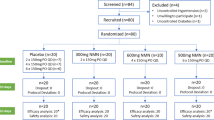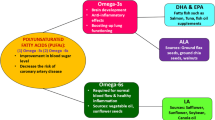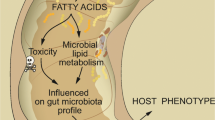Abstract
Fetuin-B is an emerging negative acute phase protein, and its expression is inversely associated with inflammation. The present study aimed to assess the impact of supplementation with curcuminoids, as naturally occurring polyphenols with anti-inflammatory properties, on circulating concentrations of fetuin-B. In this randomized double-blind trial, 30 obese dyslipidemic subjects received curcuminoids (1 g/day) and matching placebo. The trial had a 2 × 2 crossover design, in which treatment duration with either of the allocations was 4 weeks, intermitted by a 2-week washout period. Serum fetuin-B concentrations were determined at the end of each treatment period. The groups were comparable regarding baseline demographic characteristics and serum fetuin-B concentrations. Supplementation with curcuminoids did not significantly change serum fetuin-B levels compared with placebo (p > 0.05). Serum fetuin-B levels were not found to be correlated with lipid profile parameters nor C-reactive protein in either curcuminoids or placebo groups (p > 0.05). Four-week supplementation with curcuminoids in obese subjects has no significant effect on circulating fetuin-B concentrations.


Similar content being viewed by others
References
Arnaud P, Miribel L, Emerson DL (1998) Alpha 2-HS glycoprotein. Methods Enzymol 163:431–441
Azimi-Nezhad M, Ghayour-Mobarhan M, Safarian M, Esmailee H, Parizadeh SM, Rajabi-Moghadam M, Gholami A, Reza Oladi M, Ferns GA (2009) Anthropometric indices of obesity and the prediction of cardiovascular risk factors in an Iranian population. Sci World J 9:424–430
Denecke B, Graber S, Scafer C, Heiss A, Woltje M, Jahnen-Dechent W (2003) Tissue distribution and activity testing suggest a similar but not identical function of fetuin-B and fetuin-A. Biochem J 376:135–145
Ejaz A, Wu D, Kwan P, Meydani M (2009) Curcumin inhibits adipogenesis in 3T3-L1 adipocytes and angiogenesis and obesity in C57/BL mice. J Nutr 139:919–925
El-Amir YO, Hassanein KMA (2013) Protective effect of curcumin on N-nitrosodiethylamine and carbon tetrachloride-induced hepatocarcinogenesis in Sprague–Dawley rats. Comp Clin Path 22:631–636
Esmaily H, Sahebkar A, Iranshahi M, Ganjali S, Mohammadi A, Ferns G, Ghayour-Mobarhan M (2015) An investigation of the effects of curcumin on anxiety and depression in obese individuals: a randomized controlled trial. Chin J Integr Med. doi:10.1007/s11655-015-2160-z
Farjam M, Mehrabani D, Abbassnia F, Tanideh N, Imanieh MH, Pakbaz S, Ashraf MJ, Panjehshahin MR, Dehdab S (2014) The healing effect of Curcuma longa on liver in experimental acute hepatic encephalopathy of rat. Comp Clin Path. doi:10.1007/s00580-014-1883-0
Ganjali S, Sahebkar A, Mahdipour E, Jamialahmadi K, Torabi S, Akhlaghi S, Ferns G, Parizadeh SM, Ghayour-Mobarhan M (2014) Investigation of the effects of curcumin on serum cytokines in obese individuals: a randomized controlled trial. Sci World J. doi:10.1155/2014/898361
Hasan ST, Zingg JM, Kwan P, Noble T, Smith D, Meydani M (2014) Curcumin modulation of high fat diet-induced atherosclerosis and steatohepatosis in LDL receptor deficient mice. Atherosclerosis 232:40–51
Khan SA, Ali A, Khan SA, Zahran SA, Damanhouri G, Azhar E, Qadri I (2014) Unraveling the complex relationship triad between lipids, obesity, and inflammation. Mediat Inflamm 502749
Lee C, Bongcam-Rudloff E, Sollner C, Jahnen-Dechent W, Claesson-Welsh L (2009) Type 3 cystatins; fetuins, kininogen and histidine-rich glycoprotein. Front Biosci 14:2911–2922
Mirhosseini N-Z, Mohd Yusoff NA, Shahar S, Parizadeh SMR, Ghayour Mobarhen M, Shakery MT (2009) Prevalence of the metabolic syndrome and its influencing factors among adolescent girls in Mashhad, Iran. Asia Pac J Clin Nutr 18:131–136
Mohammadi A, Sahebkar A, Iranshahi M, Amini M, Khojasteh R, Ghayour-Mobarhan M, Ferns GA (2013) Effects of supplementation with curcuminoids on dyslipidemia in obese patients: a randomized crossover trial. Phytother Res 27:374–379
Olivier E, Soury E, Ruminy P, Husson A, Parmentier F, Daveau M, Salier JP (2000) Fetuin-B, a second member of the fetuin family in mammals. Biochem J 350 Pt 2:589–597
Ombrellino M, Wang H, Yang H, Zhang M, Vishnubhakat J, Frazier A, Scher LA, Friedman SG, Tracey KJ (2001) Fetuin, a negative acute phase protein, attenuates TNF synthesis and the innate inflammatory response to carrageenan. Shock 15:181–185
Pădure L, Ignat IS, Eşanu I, Hurjui J (2011) Prevalence of metabolic syndrome in a population of transport workers-prospective study. Rev Med Chir Soc Med Nat Iasi 115:1048–1051
Panahi Y, Sahebkar A, Amiri M, Davoudi SM, Beiraghdar F, Hoseininejad SL, Kolivand M (2012a) Improvement of sulphur mustard-induced chronic pruritus, quality of life and antioxidant status by curcumin: results of a randomised, double-blind, placebo-controlled trial. Br J Nutr 108:1272–1279
Panahi Y, Sahebkar A, Parvin S, Saadat A (2012b) A randomized controlled trial on the anti-inflammatory effects of curcumin in patients with chronic sulphur mustard-induced cutaneous complications. Ann Clin Biochem 49:580–588
Panahi Y, Khalili N, Hosseini MS, Abbasinazari M, Sahebkar A (2014a) Lipid-modifying effects of adjunctive therapy with curcuminoids-piperine combination in patients with metabolic syndrome: results of a randomized controlled trial. Complement Ther Med 22:851–857
Panahi Y, Ghanei M, Bashiri S, Hajihashemi A, Sahebkar A (2014b) Short-term curcuminoid supplementation for chronic pulmonary complications due to sulfur mustard intoxication: positive results of a randomized double-blind placebo-controlled trial. Drug Res (Stuttg). doi:10.1055/s-0034-1389986
Panahi Y, Rahimnia AR, Sharafi M, Alishiri G, Saburi A, Sahebkar A (2014c) Curcuminoid treatment for knee osteoarthritis: a randomized double-blind placebo-controlled trial. Phytother Res 28:1625–1631
Panahi Y, Ghanei M, Hajhashemi A, Sahebkar A (2014d) Effects of curcuminoids-piperine combination on systemic oxidative stress clinical symptoms and quality of life in subjects with chronic pulmonary complications due to sulfur mustard: a randomized controlled trial. J Diet Suppl. doi:10.3109/19390211.2014.952865
Panahi Y, Saadat A, Beiraghdar F, Sahebkar A (2014e) Adjuvant therapy with bioavailability-boosted curcuminoids suppresses systemic inflammation and improves quality of life in patients with solid tumors: a randomized double-blind placebo-controlled trial. Phytother Res 28:1461–1467
Panahi Y, Badeli R, Karami GR, Sahebkar A (2015a) Investigation of the efficacy of adjunctive therapy with bioavailability-boosted curcuminoids in major depressive disorder. Phytother Res 29:17–21
Panahi Y, Alishiri GH, Parvin S, Sahebkar A (2015b) Mitigation of systemic oxidative stress by curcuminoids in osteoarthritis: results of a randomized controlled trial. J Diet Suppl. doi:10.3109/19390211.2015.1008611
Panahi Y, Hosseini MS, Khalili N, Naimi E, Majeed M, Sahebkar A (2015c) Antioxidant and anti-inflammatory effects of curcuminoid-piperine combination in subjects with metabolic syndrome: a randomized controlled trial and an updated meta-analysis. Clin Nutr S0261–5614(15):00002–00003
Park E, Bae E, Yi J, Kim Y, Choi K, Lee SH, Yoon J, Lee BC, Park K (2010) Repeated-dose toxicity and inflammatory responses in mice by oral administration of silver nanoparticles. Environ Toxicol Pharmacol 30:162–168
Picard F, Auwerx J (2002) PPAR(gamma) and glucose homeostasis. Annu Rev Nutr 22:167–197
Rodgers JT, Lerin C, Haas W, Gygi SP, Spiegelman BM, Puigserver P (2005) Nutrient control of glucose homeostasis through a complex of pgc-1alpha and sirt1. Nature 434:113–118
Sahebkar A (2010) Molecular mechanisms for curcumin benefits against ischemic injury. Fertil Steril 94:e75–e76, author reply e77
Sahebkar A (2013) Why it is necessary to translate curcumin into clinical practice for the prevention and treatment of metabolic syndrome? Biofactors 39:197–208
Sahebkar A (2014a) Curcuminoids for the management of hypertriglyceridaemia. Nat Rev Cardiol 11:123
Sahebkar A (2014b) Are curcuminoids effective C-reactive protein-lowering agents in clinical practice? Evidence from a meta-analysis. Phytother Res 28:633–642
Sahebkar A (2015) Dual effect of curcumin in preventing atherosclerosis: the potential role of pro-oxidant-antioxidant mechanisms. Nat Prod Res 29:491–492
Sahebkar A, Mohammadi A, Atabati A, Rahiman S, Tavallaie S, Iranshahi M, Akhlaghi S, Ferns GA, Ghayour-Mobarhan M (2013) Curcuminoids modulate pro-oxidant-antioxidant balance but not the immune response to heat shock protein 27 and oxidized LDL in obese individuals. Phytother Res 27:1883–1888
Sahebkar A, Chew GT, Watts GF (2014) Recent advances in pharmacotherapy for hypertriglyceridemia. Prog Lipid Res 56:47–66
Sahebkar A, Serban MC, Ursoniu S, Banach M (2015) Effect of curcuminoids on oxidative stress: a systematic review and meta-analysis of randomized controlled trials. J Funct Foods 18:898–909
Seo KI, Choi MS, Jung UJ, Kim HJ, Yeo J, Jeon SM, Lee MK (2008) Effect of curcumin supplementation on blood glucose, plasma insulin, and glucose homeostasis related enzyme activities in diabetic db/db mice. Mol Nutr Food Res 52:995–1004
Shoba G, Joy D, Joseph T, Majeed M, Rajendran R, Srinivas PS (1998) Influence of piperine on the pharmacokinetics of curcumin in animals and human volunteers. Planta Med 64:353–356
Singh S, Aggarwal BB (1995) Activation of transcription factor nf-kappa b is suppressed by curcumin (diferuloylmethane). J Biol Chem 270:24995–25000
Sturm R (2007) Increases in morbid obesity in the USA: 2000–2005. Public Health 121:492–496
Wannamethee SG, Shaper AG, Whincup PH (2006) Modifiable lifestyle factors and the metabolic syndrome in older men: effects of lifestyle changes. J Am Geriatr Soc 54:1909–1914
Woltje M, Tschoke B, von Bulow V, Westenfeld R, Denecke B, Graber S, Jahnen-Dechent W (2006) CCAAT enhancer binding protein beta and hepatocyte nuclear factor 3beta are necessary and sufficient to mediate dexamethasone-induced up-regulation of alpha2HS-glycoprotein/fetuin-A gene expression. J Mol Endocrinol 36:261–277
Yang Y, Duan W, Lin Y, Yi W, Liang Z, Yan J, Wang N, Deng C, Zhang S, Li Y, Chen W, Yu S, Yi D, Jin Z (2013) Sirt1 activation by curcumin pretreatment attenuates mitochondrial oxidative damage induced by myocardial ischemia reperfusion injury. Free Radic Biol Med 65:667–679
Acknowledgments
This study was financially supported by a grant from the Mashhad University of Medical Sciences Research Council (Mashhad, Iran). The support granted by the Iran National Science Foundation (Tehran, Iran) is also gratefully acknowledged.
Author information
Authors and Affiliations
Corresponding author
Ethics declarations
The study protocol was approved by the Ethics Committee at the Mashhad University of Medical Sciences, Mashhad, Iran (code: 930592).
Rights and permissions
About this article
Cite this article
Saberi Karimian, M., Ghayour-Mobarhan, M. & Sahebkar, A. Clinical evaluation of the effects of supplementation with curcuminoids on serum fetuin-B concentrations in obese subjects. Comp Clin Pathol 25, 525–530 (2016). https://doi.org/10.1007/s00580-015-2217-6
Received:
Accepted:
Published:
Issue Date:
DOI: https://doi.org/10.1007/s00580-015-2217-6




